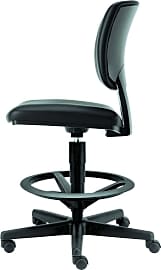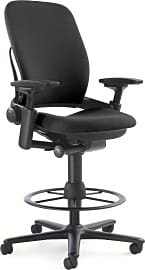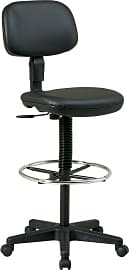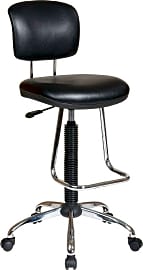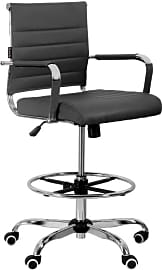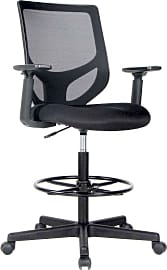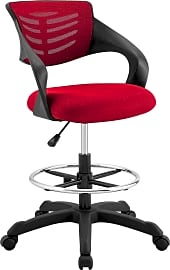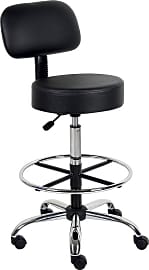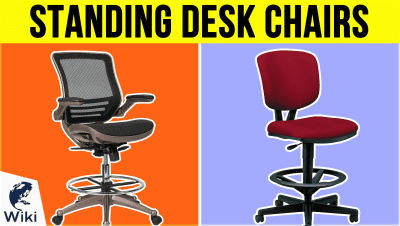The 10 Best Drafting Chairs

This wiki has been updated 36 times since it was first published in October of 2016. Ideal for architects, graphic designers and illustrators, these drafting chairs are constructed to allow users to work for long periods of time in comfort at a greater height than a typical desk or work surface. They're meant for use with standing desks or drafting tables and are available in a range of styles to accommodate people of different sizes, weights, and occupations. When users buy our independently chosen editorial choices, we may earn commissions to help fund the Wiki.
Editor's Notes
April 21, 2021:
While the Flash Furniture 8801 remains the best balance of cost, performance, and appearance, there are a couple new additions that we're excited to recommend. One is the Safco Task Master, which may not look like much, but offers some important touches like an extra-wide base and adjustable foot ring height. If you don't need something flashy, it's an excellent choice for getting work done.
Another newcomer is the Steelcase Leap, which is almost identical to the non-drafting chair of the same name. If you plan on using it for several hours a day, it really is worth considering making the investment, as it can help your posture over the long term and even help minimize the risk of repetitive strain injury. Alternatively, if you really want something from an established manufacturer but don't want to spend a fortune, the Hon Volt H5705 is a polished and dependable choice that's also reasonably priced.
February 12, 2020:
Drafting chairs are a little different than standard office or desk chairs. They're a bit taller, and specifically meant for sitting at a drafting table, though they're also great for use with standing desks to take the monotony out of standing in one place all day. Because they're not designed to provide the same kind of support as ergonomic chairs, there aren't as many ultra high-end options available, so generally speaking, the most you'll have to pay for a good one is a couple hundred.
The Flash Furniture 8801 and Poly and Bark Correna are two of the fanciest looking and also provide great back support. They're a touch more expensive than many others, but still not too pricey. The Modway Edge is another affordable model outfitted with flip-up arms, and while those of the SmugDesk SmugChair don't flip up, they do adjust vertically. And if you're looking for something that's as subtly attractive as it is functional, check out the Flash Furniture DFT, which has fixed arms and is made in the classic style of a leather office chair.
The Hon Volt H5705 and Office Star DC517V are two of the most popular armless models, and their stark minimalist designs are preferred by some artists because there's nothing to get in the way of working. The Office Star DC420 takes the armless design and adds an unconventional, straight foot bar rather than the common foot ring, which a small portion of users find uncomfortable. The Modway Thrive technically has arms, but they're so recessed that they shouldn't be an issue for any but the lankiest users. Of course, nothing gets more minimalist than the Boss Office Products DOT, which can hardly even be considered a chair, but for the right owner, it can actually significantly enhance posture.
The Importance Of Good Posture
Poor posture is also a problem for digestion, as slouching has the potential to impede the elimination of waste as it accumulates in your intestines.
We’re all told from an early age how important it is to maintain good posture. Yet, despite these warnings, a vast amount of people still maintain terrible habits when it comes to safeguarding the curve of their spine. It’s not just about comfort, either. Slouching and developing bad posture can have seriously negative effects on your health.
One of those effects is the deepening of depression. Part of this is a psychological phenomenon, sort of how forcing yourself to smile can actually release chemicals in the brain that tell you you’re happy, but in the opposite direction. When you slouch, you exacerbate the feelings of helplessness and weakness that accompany depression. What’s more, slouching and sitting poorly prevent you from taking the deepest possible natural breaths, thereby reducing your oxygen intake and bumming you out even more.
Poor posture is also a problem for digestion, as slouching has the potential to impede the elimination of waste as it accumulates in your intestines. If you already eat a diet rich in meats, many of which have a tendency to linger in the gut, you’d better as least find a way to sit up straight.
One study from Harvard revealed that good posture has a significant effect on testosterone levels, increasing them by as much as 20 percent. This is another positive feedback loop, as a straight spine and open shoulders is often viewed as a position of power, and it can literally make you more powerful by boosting the very hormone associated with strength. The reverse is also true, as sitting in a slouched position causes an uptick in the release of cortisol, the stress hormone, to the tune of 15 percent, accompanied by a 10 percent reduction in testosterone.
Even if all of these health benefits weren’t enough to convince you that you need to find ways to improve your posture (such as purchasing a drafting chair), there’s one thing that ought to be guaranteed to convince you: your vanity. Poor posture will make you look fatter than you are. It causes whatever fat you have in your belly area to compress and jut out, while standing or sitting up straight causes that fat to distribute more evenly while also pushing your chest forward so that your clothes hang in a more forgiving manner. Whatever your ultimate reason for investing in a drafting chair, know that doing so will be good for you in countless ways.
How To Choose The Right Drafting Chair For You
In order to figure out what the best possible drafting chair for you might be, it’s important to take a look at the difference between a drafting chair and any other seat. At first glance, it may be difficult to differentiate these models from many of the office chairs you may have seen or used in the past. The truth is that this is actually a square-rectangle situation, in which all drafting chairs are office chairs, but not all office chair are drafting chairs.
This will largely be determined by the size of your body and the height of your desk.
A drafting chair is specifically designed for workers who utilize elevated desktop surfaces to perform their tasks. Drafting tables are often much taller than common office desks, so they require taller chairs for workers to use them comfortably. A drafting chair allows for this comfort by employing two things that few other office chairs have: additional elevation and foot rests.
Once you account for those differences, choosing a drafting chair becomes like choosing any other office chair. The height of a drafting chair should be adjustable, and it should provide you with a range that will let you reach your desk in comfort. This will largely be determined by the size of your body and the height of your desk. If you work at a standing desk, for example, and you want a chair you can use for intermittent resting periods during which you continue to get work done, you’re going to want the tallest option out there. If you work at a normal desk, on the other hand, but you like the height option, additional foot rests (great for short people), and overall look of these chairs, then a unit with less extension will serve you just fine.
These chairs, like many good office chairs, often offer some degree of lumbar support, as well. This is probably one of the most important aspects of a chair, as it will help determine how much the unit affects your posture and how comfortable you find it to be. Unfortunately, this is also one of the most subjective aspects of a given drafting chair, so if you have the ability to try one or two of these models out in a store before buying online, it might be worth your time.
Other features to take into account are the armrests — specifically their position, adjustability, and padding —, the durability of a chair’s materials, and the quality of its casters in the models that allow for movement.
A Very Brief History Of The Chair
The chair is often used by philosophers to question what gives an object its right to exist in our minds. A chair is, in these cases, often defined by its purpose: that anything you sit on is a chair. If that’s true, then the first chair was born the moment the first human plopped its bottom down on anything that wasn’t the ground.
If we go so far as to say that a chair is something that is purpose-built for sitting, then we can begin to find evidence of its actual origins. Here, we find ourselves comparing the efforts of the Egyptians and the Chinese, two cultures often cited for the development of household technologies. Each culture had its own early version of the chair, though evidence suggests the Egyptians beat the Chinese to this one by a long shot. In either culture, however, the chair was reserved for the most affluent of individuals, and everybody else sat on stools, benches, chests, or just about anything else that could support their weight.
In less affluent households, if there was a chair, it was reserved for the most important person. Fascinatingly, this mentality survived millennia; as recently as the creation of television character Archie Bunker, the idea of the man of the house having “his chair” that no one else could sit in was a mainstay in American culture.



